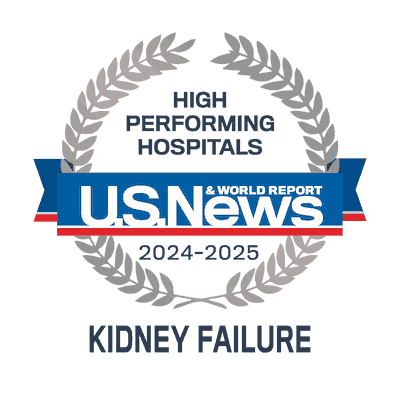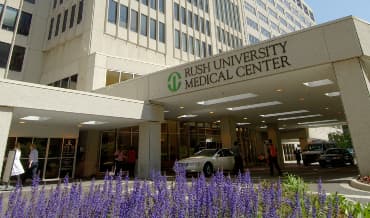A kidney transplant is surgery to implant a healthy kidney from a donor into a patient with very poor kidney function or kidney failure. It’s also called a renal transplant, and it’s the treatment of choice for many people because it usually offers a better quality of life than dialysis and improves overall health.
Dialysis can be very limiting for you. There are restrictions on diet and the amount of fluids you can drink. You must schedule appointments and may not be able to travel. You’ll likely feel drained and exhausted after treatments.
A kidney transplant can make a huge difference. It can ease diet restrictions, reduce limits on fluid intake, improve your energy levels and allow you to travel and live your life. Kidney transplant recipients also tend to live longer than patients who qualify for a transplant and don’t get one.
The Rush Approach to Kidney Transplant Surgery
At Rush, our kidney transplant surgeons and specialists are highly experienced in complex kidney transplants, consistently achieving higher than the national average for patient survival rates.
Our team specializes in the full range of transplant needs — from common to complex cases. We will meet with you within two weeks of your first call to Rush.
When we meet with you, we take into account both your medical and emotional needs. Our goal is to help you return to leading a happy, healthy life.

Who Can Get a Kidney Transplant?
If you have been diagnosed with end-stage kidney disease or renal failure, your doctor will refer you for a kidney transplant evaluation. During your evaluation, you’ll meet with our care coordinators who will help set up appointments, a dietitian, social workers, pharmacists and the transplant surgeon. They’ll all help you find out if you’re a good candidate for a kidney transplant.
When our care team evaluates you to see if transplant surgery is right for you, they’ll consider the following:
- Your glomerular filtration rate, or GFR, is under 20. This means your kidney function is very poor. Most people who have been on dialysis have a GFR under 20.
- You are in good enough health to undergo and recover from major surgery.
- Your heart health and possible diabetes are under control.
- You are capable of taking your medication regularly after surgery and keeping up with follow-up care.
- You have a good enough support system at home.
If you don’t qualify for transplant surgery after your evaluation, you may still qualify later on after spending some time on dialysis. Your care team will let you know about all your options for treatment.
How Does the Kidney Transplant Waitlist Work?
If you qualify for transplant surgery after evaluation, our care coordinators will send you a letter to notify you that you’ve been placed on the waitlist.
Unlike waitlists for other types of transplant surgery, the kidney transplant waitlist depends more on how much time a patient has already waited, undergone treatment and been on dialysis, rather than how sick they are. For example, if you’ve been on dialysis for five years, you’d have five years counted toward your time on the waitlist.
Beyond that, your time on the waitlist can depend on several factors. If you have a living donor arranged, you don’t have to spend much time, if any, on a waitlist for kidney transplant surgery. If you need a kidney from a deceased donor, you’ll likely have to wait for a good match.
The United Network for Organ Sharing, or UNOS, is the nonprofit organization that handles all matching of kidney transplant recipients and deceased donors in the country. It relies on an algorithm that uses many factors, including blood type, antibodies, age, geography and time spent on the waitlist.
Once you move through the waitlist and have a matching donor, our care team will contact you and get you ready for surgery.
The average waiting time for patients to get a kidney transplant is five years, but this can vary a lot depending on each individual case. For example, if you’ve been on dialysis for many years, your wait time may be quite short, possibly even a few weeks or months.
Older patients also tend to have shorter wait times than younger patients. This is because most deceased donors are over 50 years old, so they tend to be better matches for older kidney transplant recipients.
How Does the Living Kidney Donor Program Work?
A living person can often donate one of their kidneys safely to someone they know who needs a kidney transplant.
Some people can also choose to become “altruistic donors.” These are living kidney donors who are willing to donate to anyone in need, not necessarily someone they know.
All living donors, whether altruistic or donating to a person they know, will have to be evaluated to make sure that they are good candidates for organ donation.
The only way to find out if someone is a good candidate to be a living donor is to get a proper evaluation. So if you or someone you know is considering donating, make that decision with a doctor. Do not assume a possible donor won’t qualify because they don’t think they’re healthy enough or a good match.
Our living donor coordinator will handle setting up an evaluation. During this evaluation, a care team will perform tests and go over all information the donor needs to make an informed decision, including possible risks.
The donor’s health information will not be shared with the kidney transplant recipient. If you choose to go through an evaluation to donate, your test results remain private, and you can decide not to donate at any time if you wish.
A living donor may have to meet certain criteria that a deceased donor would not. For example, mild hypertension or diabetes in a deceased donor might not disqualify them from organ donation. But for a living donor, these conditions may mean that they’ll need to rely on both of their kidneys, either now or in the future, so they might not be able to safely donate.
The main benefit of the living kidney donor program is that, if you have someone who qualifies to donate a kidney for you, you won’t need to be placed on the deceased donor waitlist.
Your living donor may not be a direct match for you. For example, their blood type might prevent your body from accepting their kidney. But Rush participates in the National Kidney Registry. This is a nonprofit that works with many other transplant programs and runs an algorithm to match living donors to recipients, much like UNOS does for deceased organ donors.
This registry can pair you and your non-matching living donor with another patient who matches your donor and has a living donor who is a match for you. In this way, you make a sort of “swap” of living donors.
What Happens During Kidney Transplant Surgery?
Once a donor is found for you, your care team will call you to come in for surgery. They will run a few basic tests to make sure you’re ready for the procedure. These tests will not be as extensive as the evaluation you’ve gone through to get on the waitlist or be approved for the transplant.
As a precaution, the team will also examine the donated kidney to make sure it is ready for transplant if it's from a deceased donor. If you have a living donor, they will have been evaluated for kidney health beforehand.
When you’re ready for surgery, you’ll go under general anesthesia, which will completely put you to sleep. The surgery team will then put in a breathing tube, which they will remove at the end of the surgery. They’ll also put in a urinary catheter, which will be removed as you recover in about three to four days.
During the surgery, the kidney transplant surgeon will not remove your existing kidneys except in very rare cases, such as infection or polycystic kidney disease. Instead, they implant the donor kidney just above the groin and connect it to the renal artery and vein and the ureter. The reason for placing the new kidney there and not removing your existing kidneys is because it is less complicated. The kidneys you have won’t interfere with the new kidney’s function.
A stent, or small tube, will be placed in the ureter to keep it from swelling shut. About four weeks later, your care team will perform a cystoscopy and remove the stent.
After surgery, the team will wake you in the operating room and transfer you to the intensive care unit. You’ll get IV fluids and pain medication. By the next day, you’ll likely transfer out of intensive care, your IV fluids will be reduced, and you’ll be able to eat some food.
Most patients can leave the hospital after three to four days, though some may need to stay longer. Recovery can vary from patient to patient.
If you received a kidney from a living donor, it is likely that your kidney function will be fairly good shortly after surgery. If your kidney is from a deceased donor, you may need to have some dialysis as you recover.
Once you go home, you’ll need to take oral medications. You’ll need follow-up care about twice a week at first. The care team will test your kidney function and make sure your medications are working.
You’ll likely be able to start returning to normal activities after about one to two months. You won’t need to come in for follow-up care as frequently, but you will need lifelong monitoring and medications.
Excellence in Kidney Transplant Care
- Excellent outcomes: Rush kidney transplant surgery patients have excellent outcomes. We have some of the best patient survival rates among transplant programs in Chicago, according to the Scientific Registry of Transplant Recipients.
- Personalized care: Our kidney transplant specialists are focused on education, support and helping you learn how to manage your care before and after your transplant.
- Specialized care for complex cases: If you have a complicated health history — including having HIV, hepatitis C or heart and vascular disease — we can help. Our transplant specialists can handle the most complex cases, even performing many successful kidney transplants for people who’ve had transplant surgery in the past.
- Follow-up care where — and when — you need it: A kidney transplant surgery is a major procedure that requires lifelong follow-up care. We make it easy for you to get that care, with convenient locations in Chicago and Crown Point, Indiana.
- Second opinion services: If you're looking for a second opinion, RUSH offers second opinion services to help you explore all your treatment options for kidney disease and renal failure, including kidney transplant.
Kidney Transplant FAQs
A kidney transplant at Rush is considered very safe in most cases. There are certain risks and possible side effects that your surgeon will discuss with you. But the benefits of kidney transplant surgery tend to outweigh any possible risks.
A kidney transplant is a serious surgery that requires hospitalization, recovery and lifelong follow-up care. But over time, most patients find that their quality of life improves after surgery. Follow-up care and medications tend to be less disruptive and easier to manage than dialysis, and there are fewer restrictions on diet and fluid intake. Patients who get kidney transplants also tend to live longer than those who qualify and do not get transplant surgery.
The kidney transplant surgery itself usually takes about four to five hours to complete. You will need some more time beforehand to get prepared, and you’ll need time after to recover.
Recovery time after kidney transplant can vary among patients. Usually, patients spend about three days to a week recovering in the hospital, then one to two months at home before they can return to most normal activities. Patients will need lifelong care after surgery, which includes monitoring and medications.
The scar from a kidney transplant surgery depends a lot on the individual recipient. But a typical scar is about 10 centimeters or 4 inches long at the site of the incision.
As with any major surgery, there are possible risks of bleeding, infection or damage to tissue around the site of the procedure.
In the long term, certain medications needed after transplant surgery may also have some risks. For example, immunosuppressive medications can slightly increase the risk for infection and certain cancers.
Another possible risk is organ rejection. This risk can be reduced with diligent follow-up care and keeping up with all prescribed medications after surgery.
All of these risks usually don’t outweigh the many benefits of kidney transplant surgery and having a functional kidney.
Many signs of kidney rejection after transplant are found through the patient’s monitoring and testing during follow-up care with their physician. This monitoring is very important for catching the signs of rejection early and intervening before major symptoms appear.
If a patient does not keep up with follow-up care, they may start to see signs of kidney failure from organ rejection. These can include the following:
- Nausea, vomiting
- Difficulty urinating
- Fluid retention, causing swelling of the legs, ankles or feet
- Fatigue
- Shortness of breath
- High blood pressure
- Weakness or muscle cramps
The contact information of both the donor’s family and the recipient is confidential unless both parties agree to share it.
But each kidney transplant recipient is encouraged to write a letter anonymously to the donor’s family if they would like to do so. This letter will be delivered, and if both parties want further contact, that will be arranged.
Both the donor and recipient’s information are confidential. But you are encouraged to write an anonymous letter that will be delivered to your donor. After that, if you and your donor would both like to meet, that will be facilitated.







